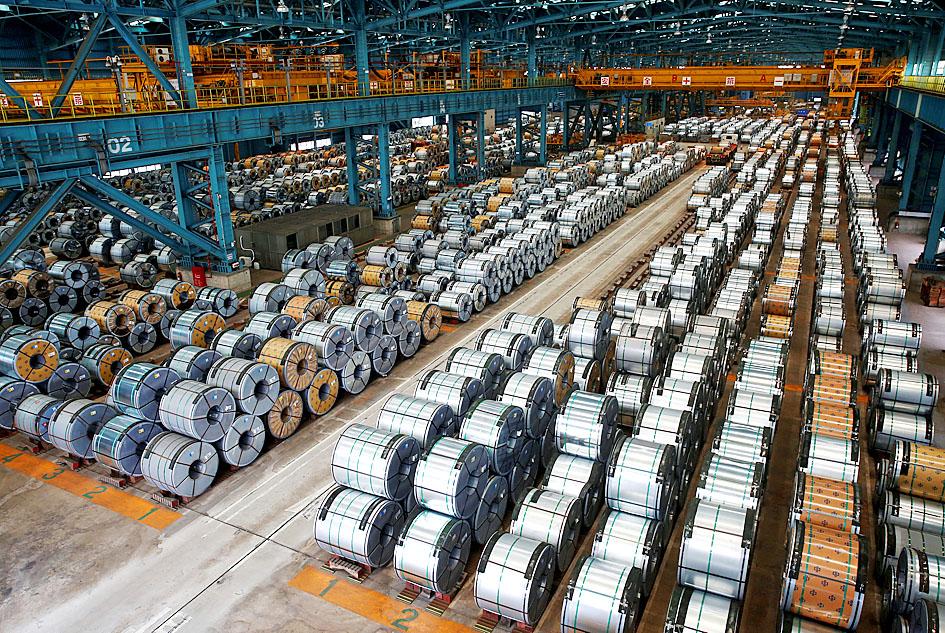China Steel Corp (中鋼), the nation’s largest steelmaker, yesterday said it is cutting its steel prices by about 1.62 percent for domestic deliveries next month in response to lower demand due to accumulated inventory, global port congestion and the appreciation of the New Taiwan dollar.
The adjustments mean that prices of hot-rolled sheets, hot-rolled coils and electro-galvanized coils would fall by NT$500 per tonne next month, while prices of cold-rolled coils would fall by NT$700 per tonne, the largest cut among all products, China Steel said.
The price of hot-dipped zinc-galvanized coils used for construction and home appliances would decrease by NT$500 per tonne, the company said.

Photo: Tyrone Siu, Reuters
The reductions follow an average downward adjustment of 2.15 percent for deliveries this month, which the company announced on Dec. 22, corporate data showed.
Weaker demand has affected steel exports and reduced its number of customers, prompting the price cuts, the company said in a statement.
“Global supply chain blockages have increased due to ongoing gridlock at ports worldwide, and inventory levels remains high,” the statement said. “Meanwhile, exports would not benefit from a strong NT dollar, which has appreciated to a 25-year high against the US dollar.”
The spread of the Omicron variant of SARS-CoV-2 also dampened demand, the Kaohsiung-based company said.
Its price-adjustment strategy is “appropriate and follows the trend,” the steelmaker said.
Despite cutting prices for the domestic market, China Steel holds an upbeat outlook for the global market, as demand from suppliers of petroleum steel pipe is likely to increase on the back of rising prices of crude oil and a growing number of oil fields, the company said.
However, global steel supply might fall as China continues to lower its steel output to meet its target of carbon neutrality, it said, adding that South Korea is also reducing its steel manufacturing to curb carbon emissions.
South Korea’s Pohang Iron and Steel Co last month terminated a furnace with a capacity of 1 million tonnes per year, China Steel said.
“Based on developments in global supply and demand, we think that, although steel prices are in a correction cycle after dropping from a peak last quarter, they will rebound after the Lunar New Year,” it said.
Luxembourg-based ArcelorMittal SA is to raise prices of some steel materials by 30 to 50 euros per tonne, China Steel said.
Steel prices have also increased in northern and southern Europe, it said.

TARIFFS: The global ‘panic atmosphere remains strong,’ and foreign investors have continued to sell their holdings since the start of the year, the Ministry of Finance said The government yesterday authorized the activation of its NT$500 billion (US$15.15 billion) National Stabilization Fund (NSF) to prop up the local stock market after two days of sharp falls in reaction to US President Donald Trump’s new import tariffs. The Ministry of Finance said in a statement after the market close that the steering committee of the fund had been given the go-ahead to intervene in the market to bolster Taiwanese shares in a time of crisis. The fund has been authorized to use its assets “to carry out market stabilization tasks as appropriate to maintain the stability of Taiwan’s

STEEP DECLINE: Yesterday’s drop was the third-steepest in its history, the steepest being Monday’s drop in the wake of the tariff announcement on Wednesday last week Taiwanese stocks continued their heavy sell-off yesterday, as concerns over US tariffs and unwinding of leveraged bets weighed on the market. The benchmark TAIEX plunged 1,068.19 points, or 5.79 percent, to 17,391.76, notching the biggest drop among Asian peers as it hit a 15-month low. The decline came even after the government on late Tuesday authorized the NT$500 billion (US$15.2 billion) National Stabilization Fund (國安基金) to step in to buoy the market amid investors’ worries over tariffs imposed by US President Donald Trump. Yesterday’s decline was the third-steepest in its history, trailing only the declines of 2,065.87 points on Monday and

TARIFF CONCERNS: The chipmaker cited global uncertainty from US tariffs and a weakening economic outlook, but said its Singapore expansion remains on track Vanguard International Semiconductor Corp (世界先進), a foundry service provider specializing in producing power management and display driver chips, yesterday withdrew its full-year revenue projection of moderate growth for this year, as escalating US tariff tensions raised uncertainty and concern about a potential economic recession. The Hsinchu-based chipmaker in February said revenues this year would grow mildly from last year based on improving supply chain inventory levels and market demand. At the time, it also anticipated gradual quarter revenue growth. However, the US’ sweeping tariff policy has upended the industry’s supply chains and weakened economic prospects for the world economy, it said. “Now

An employment discrimination lawsuit against contract chipmaker Taiwan Semiconductor Manufacturing Co (TSMC, 台積電) might soon be expanded after a hearing in a federal court in San Jose, California, on Tuesday to add 15 plaintiffs to the case. According to a court document, the lawsuit, which was refiled in November last year as a form of a class action with 13 plaintiffs in California, wants to add 15 plaintiffs from Arizona, where TSMC is building up its wafer fab capacity. TSMC first committed between 2020 and last year to invest US$65 billion in three advanced wafer fabs in Arizona. It then pledged an